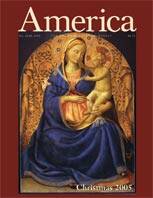De-Christianizing Christmas?
In recent years there has been a lively controversy about “de-Christianizing” Christmas. We all now speak vaguely about “the holidays.” In some circles the greeting “Merry Christmas” has become forbidden speech. Whether one regards this debate as serious or silly, it does raise an important question: What do we celebrate on Dec. 25?
There are four sets of Scripture readings for Masses at Christmas, each tied to a different time of day. At the Vigil Mass Matt 1:1-25 roots the birth of Jesus in Israel’s history and biblical prophecy (Isa 7:14). At midnight the classic Christmas story from Luke 2:1-14 is read, while at dawn we hear about the shepherds’ visit to the infant Jesus from Luke 2:15-20. During the day the Gospel passage is the prologue to John’s Gospel (1:1-18). The Old Testament readings are from various parts of Isaiah, and the second readings highlight the glorious manifestation of the Word made flesh among us.
No biblical text expresses better what we celebrate at Christmas than John 1:1-18, the Gospel text for Masses during the day. What is now the prologue to John’s Gospel is very likely based on an early Christian hymn that celebrated Jesus as the wisdom of God. It asserts that if we want to know who God is and what God regards as true wisdom, we should look to Jesus as the Word of God.
We use words all the time to express our thoughts and emotions. When we want to know what others are thinking and feeling, we ask them to express their thoughts and emotions in words. When we call Jesus the Word of God, we are saying that he is what God was (and is) thinking and feeling, and what God wants to tell us. In Jesus the Word, God has revealed to us who God is, what God thinks and feels and what God wishes us to be and do.
At Christmas we celebrate the fact that in Jesus of Nazareth the Word has become flesh and made his dwelling among us. In this way God has revealed not only who God is but also who we are and what we can become. The great affirmation of Christmas is that when the Word became flesh, God became human and we humans have become in some sense divine. Just as Jesus is now our true brother, so we are the true brothers and sisters of the Word of God. As divine, Jesus is in a unique position to serve as the revelation of God. As human like ourselves, Jesus helps us to understand concretely who and what God is.
While the current tendency to “de-Christianize” Christmas may be regarded as either amusing or lamentable, for thoughtful Christians the message of Christmas is at once simple and profound. At Christmas we affirm with St. John that Jesus of Nazareth is the revealer and revelation of God, that in him God has told us who God is and what God wants of us, and that we now know God in a personal and intimate way.
This article also appeared in print, under the headline “De-Christianizing Christmas?,” in the December 19, 2005, issue.








